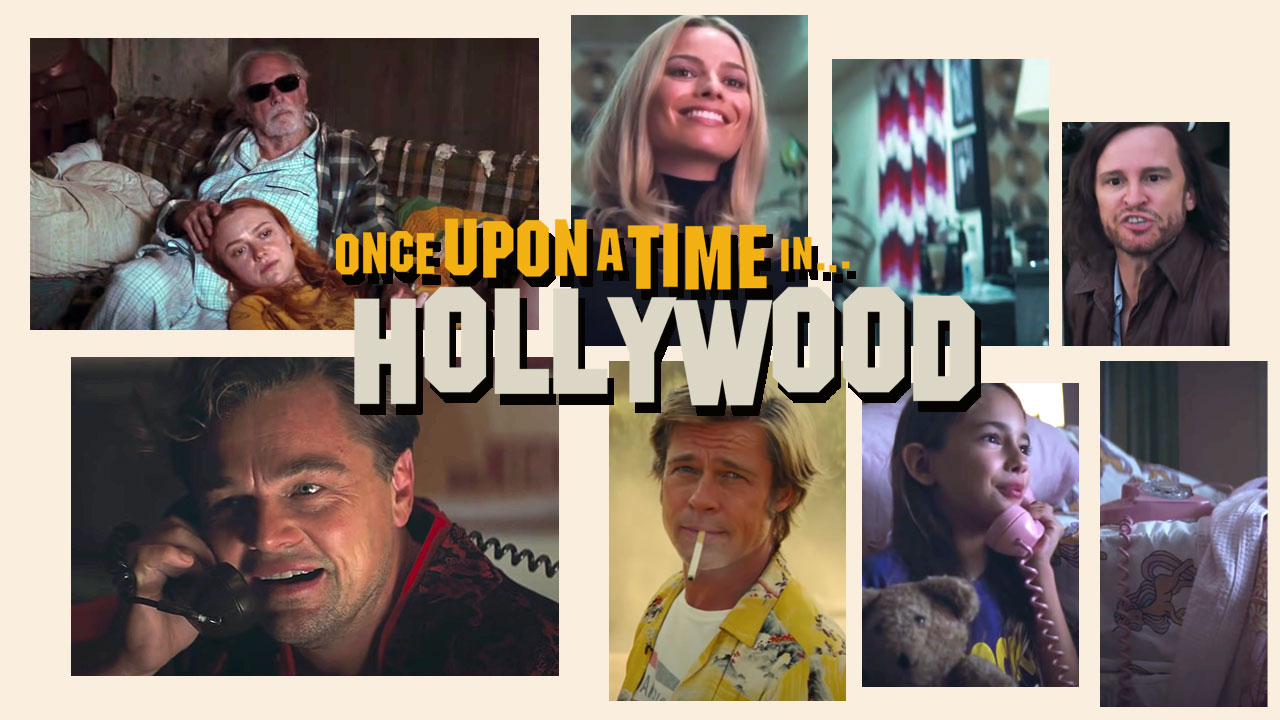Those who knocked “Once Upon a Time in Hollywood” as nothing more than a pretense for Quentin Tarantino to meticulously recreate and hang out in the 1969 Los Angeles located somewhere between his boyhood memory and imagination (like that’s a bad thing) will not be dissuaded by his new novelization of the 2019 film (our original review here), an act of uncommonly authoritative fan-fiction that goes so far as to insert mention of a li’l nine-year-old QT into its final moments.
The abundant detail of the production design and costuming, so tidily packed into the fleet cinematography of the film medium, has been laboriously reproduced for the page. Every last needle-drop, theater marquee, and garment must be named and accounted for; we get a multi-page sequence expanding on the origin story of Cliff Booth’s getup, apparently taken as payment for a gig on bikersploitation classic “Billy Jack.” The longer-winded passages of immersive scene-setting recall Tolkien’s infamous neverending descriptions of the pastries and ales the hobbits would have for lunch, and as with “Lord of the Rings,” a steadfast fandom invested in the fictive getaway being constructed won’t mind a bit. This one is for auteur loyalists only, those who cherish Quentin for his ineffable Tarantino-ness, inclined to believe that you can’t have too much of the good thing that is his slavish devotion to and stylistic evocation of B-movie history.
The original text paid homage to the forgotten names and also-rans pawing at the edges of the showbiz firmament, with the declining TV star Rick Dalton and his stuntman-turned-assistant-gofer Cliff surrounded by signifiers of the out-of-vogue. With the wider canvas of four hundred pages to play with, Tarantino can more freely indulge his passion for obscure ephemera such as the Monkees (better than the Beatles, as he’d have it), Paul Revere and the Raiders, and more midcentury action TV series than you can fire a flamethrower at. One section added for the book sees Cliff having a run-in with Aldo Ray, the great man’s-man actor undone by his profligate alcoholism. A gesture of shared humanity between the two men stops short of revising his downfall, as Tarantino does for the salvaged Sharon Tate, but does extend respectful admiration to Ray himself and his tragic imperfection.
The lack of mediating influences also means that the filmmaker-author can pursue his more prurient interests without obstruction from studio liaisons or actors skittish about borderline pornographic content. Referring to Sharon as a “big-boobed blonde,” all the vividly evocative talk about unkempt pubic bushes, book-exclusive set pieces that see Manson girl Pussycat (Margaret Qualley on-screen) stripping naked for a break-and-enter or playfully masturbating in Cliff’s car — the doubling-down on horniness for its own sake flattens the layers of ironic commentary presumed in this story’s previous form, casting Tarantino as a simpler and more straightforward artist than some of his supporters would like to think. Some strokes of eroticism, in particular Pussycat’s “kreepy krawl” (the clarity of which immediately manifests in the mind as a filmic image), suggest a more inventive relationship to carnality than can be found in the present American cinema. Others, such as the procession of faceless, unnamed women eager to perform fellatio on Cliff in expository paragraphs not worth rendering as action, less so.
Whether Tarantino means to replicate the chauvinism and other dimensions of his characters from a knowing stance, these questions of voice and subjectivity starts to break down as he sporadically converts them into mouthpieces for himself. The much-discussed tangent early on in which Cliff (confirmed to be the wife-killer the film left ambiguous) reveals himself to be an opinionated scholar of world cinema unmistakably comes right from his creator, now prepping a tome of film criticism which will enable him to air his hottest takes more directly. Though it’s not as if he’s such an involved stylist of prose; it’s clear why he’s a screenwriter first and foremost, his gift for dialogue at odds with everything else, written with a spartan efficiency going for the hard-nosed pulp fiction he loves so dearly, and landing closer to stage direction.
To an extent, mounting any critique of Tarantino’s work feels like a fool’s errand. Like Cliff striding unbothered past the feral hippies hollering him out of Spahn Ranch, he couldn’t care less about what the braying masses think of him, more evidently writing for his own satisfaction than ever before. There’s a demented sort of brilliance to it, one of the last consistent lightning rods left in a pitifully polite Hollywood hiding his most controversy-baiting material where the dullards will never bother to find it. But anyone determined enough to wade through this thicket of fetishes and anxieties articulated with unprecedented candor will discover that he only ever becomes more and more himself. [B]





